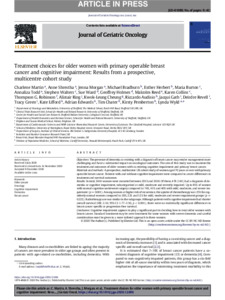MARTIN, Charlene, SHRESTHA, Anne, MORGAN, Jenna, BRADBURN, Michael, HERBERT, Esther, BURTON, Maria, TODD, Annaliza, WALTERS, Stephen, WARD, Sue, HOLMES, Geoffrey, REED, Malcolm, COLLINS, Karen, ROBINSON, Thompson G, RING, Alistair, CHEUNG, Kwok-Leung, AUDISIO, Riccardo, GATH, Jacqui, REVELL, Deirdre, GREEN, Tracy, LIFFORD, Kate, EDWARDS, Adrian, CHATER, Tim, PEMBERTON, Kirsty and WYLD, Lynda
(2020).
Treatment choices for older women with primary operable breast cancer and cognitive impairment: Results from a prospective, multicentre cohort study.
Journal of Geriatric Oncology.
[Article]
Documents
27906:565120
![[thumbnail of Burton-TreatmentChoicesOlder(VoR).pdf]](https://shura.shu.ac.uk/27906/3.hassmallThumbnailVersion/Burton-TreatmentChoicesOlder%28VoR%29.pdf)

Preview
Abstract
OBJECTIVES: The presence of dementia co-existing with a diagnosis of breast cancer may render management more challenging and have a substantial impact on oncological outcomes. The aim of this study was to examine the treatment and outcomes of older women with co-existing cognitive impairment and primary breast cancer. MATERIALS AND METHODS: A prospective, multicentre UK cohort study of women aged 70 years or over with primary operable breast cancer. Patients with and without cognitive impairment were compared to assess differences in treatment and survival outcomes. RESULTS: In total, 3416 women were recruited between 2013 and 2018. Of these, 478 (14%) had a diagnosis of dementia or cognitive impairment, subcategorised as mild, moderate and severely impaired. Up to 85% of women with normal cognition underwent surgery compared to 74%, 61% and 40% with mild, moderate, and severe impairment (p = 0.001). Among women at higher risk of recurrence, the uptake of chemotherapy was 25% for cognitively normal women compared to 20%, 22% and 12% for mild, moderate and severe impairment groups (p = 0.222). Radiotherapy use was similar in the subgroups. Although patients with cognitive impairment had shorter overall survival (HR: 2.10, 95% CI: 1.77-2.50, p < 0.001), there were no statistically significant differences in breast cancer specific or progression-free survival. CONCLUSION: Cognitive impairment appears to play a significant part in deciding how to treat older women with breast cancer. Standard treatment may be over-treatment for some women with severe dementia and careful consideration must be given to a more tailored approach in these women.
Actions (login required)
 |
View Item |



 Tools
Tools Tools
Tools